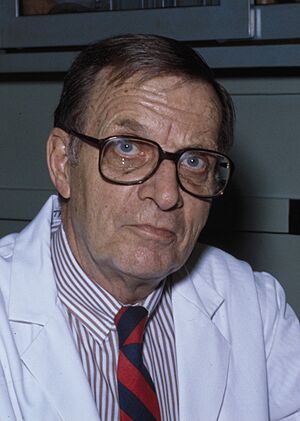Lewis Thomas facts for kids
Quick facts for kids
Lewis Thomas
|
|
|---|---|
 |
|
| Born | November 25, 1913 |
| Died | December 3, 1993 (aged 80) |
| Alma mater | Princeton University, Harvard Medical School |
| Awards | National Book Award (3) |
| Scientific career | |
| Fields | Biology, science writer, academic administration |
| Institutions | Tulane University School of Medicine |
Lewis Thomas (born November 25, 1913 – died December 3, 1993) was an American doctor, writer, and scientist. He was known for his thoughtful essays about biology and medicine. He also worked as a leader in medical schools and research centers.
Contents
Lewis Thomas: A Life in Science and Writing
Lewis Thomas was born in Flushing, New York. He went to Princeton University and then to Harvard Medical School to become a doctor. He became a very important leader in medicine. He was the Dean of Yale Medical School and the New York University School of Medicine. He also became the President of the Memorial Sloan-Kettering Institute. Early in his career, he worked as a medical researcher at Tulane University School of Medicine.
Writing and Awards
Thomas was asked to write regular essays for a famous medical journal. This journal was called the New England Journal of Medicine. He collected some of these essays into a book. This book was titled The Lives of a Cell: Notes of a Biology Watcher (1974). It was very popular and won two National Book Awards. These awards were for Arts and Letters and for The Sciences. He also won a Christopher Award for this book.
He wrote two other collections of essays. These were The Medusa and the Snail and Late Night Thoughts on Listening to Mahler's Ninth Symphony. The Medusa and the Snail also won a National Book Award.
Exploring Ideas Through Essays
Many of Thomas's essays connected different ideas. He often used the study of words, called etymology, to start his discussions. Other essays looked at how new scientific discoveries affect our culture. He also wrote about how important ecology (the study of how living things interact with their environment) is becoming.
In one essay, he talked about the worries people had. These worries were about the development of nuclear weapons. Lewis Thomas is often quoted because of his wide range of interests. People also loved his excellent writing style.
Recognition and Legacy
Lewis Thomas was a member of several important groups. These included the American Academy of Arts and Sciences (1961) and the United States National Academy of Sciences (1972). He was also part of the American Philosophical Society (1976).
Today, there is an award named after him. The Lewis Thomas Prize is given every year. It honors a scientist for their artistic achievements. Lewis Thomas passed away in 1993. He died from a type of cancer.
Books by Lewis Thomas
- The Lives of a Cell: Notes of a Biology Watcher, 1974, Viking Press: ISBN: 0-670-43442-6, Penguin Books, 1995 reprint: ISBN: 0-14-004743-3
- A Long Line of Cells. Collected Essays, 1987, Viking Penguin. ASIN B000UWN4OM
- The Medusa and the Snail: More Notes of a Biology Watcher, 1979, Viking Press: ISBN: 0-670-46568-2, Penguin Books, 1995 reprint: ISBN: 0-14-024319-4
- Late Night Thoughts on Listening to Mahler's Ninth Symphony, 1983, Viking Press: ISBN: 0-670-70390-7, Penguin Books, 1995 reprint: ISBN: 0-14-024328-3
- The Youngest Science: Notes of a Medicine-Watcher, 1983, Viking: ISBN: 0-670-79533-X, Penguin Books, 1995 reprint: ISBN: 0-14-024327-5
- Et Cetera, Et Cetera: Notes of a Word-Watcher, 1990. Little Brown & Co ISBN: 0-316-84099-8, Welcome Rain, 2000 ISBN: 1-56649-166-5
- The Fragile Species, 1992, Scribner, ISBN: 0-684-19420-1, Simon & Schuster, 1996 paperback: ISBN: 0-684-84302-1
Famous Quote
‘Science progresses at the interface of the specialized and the universal.’

